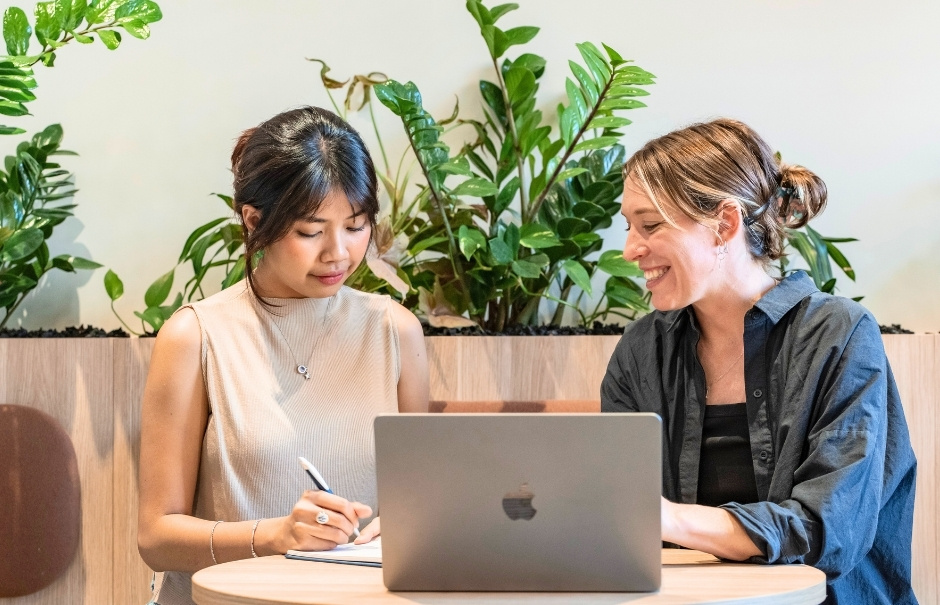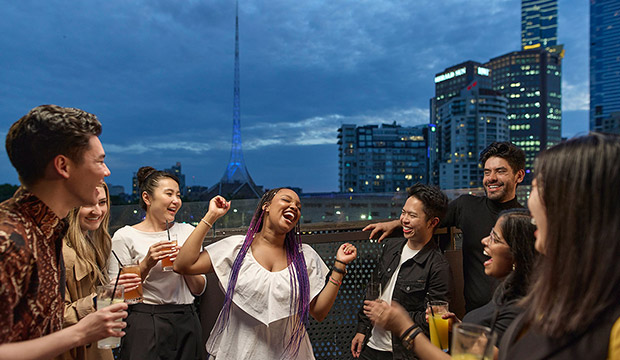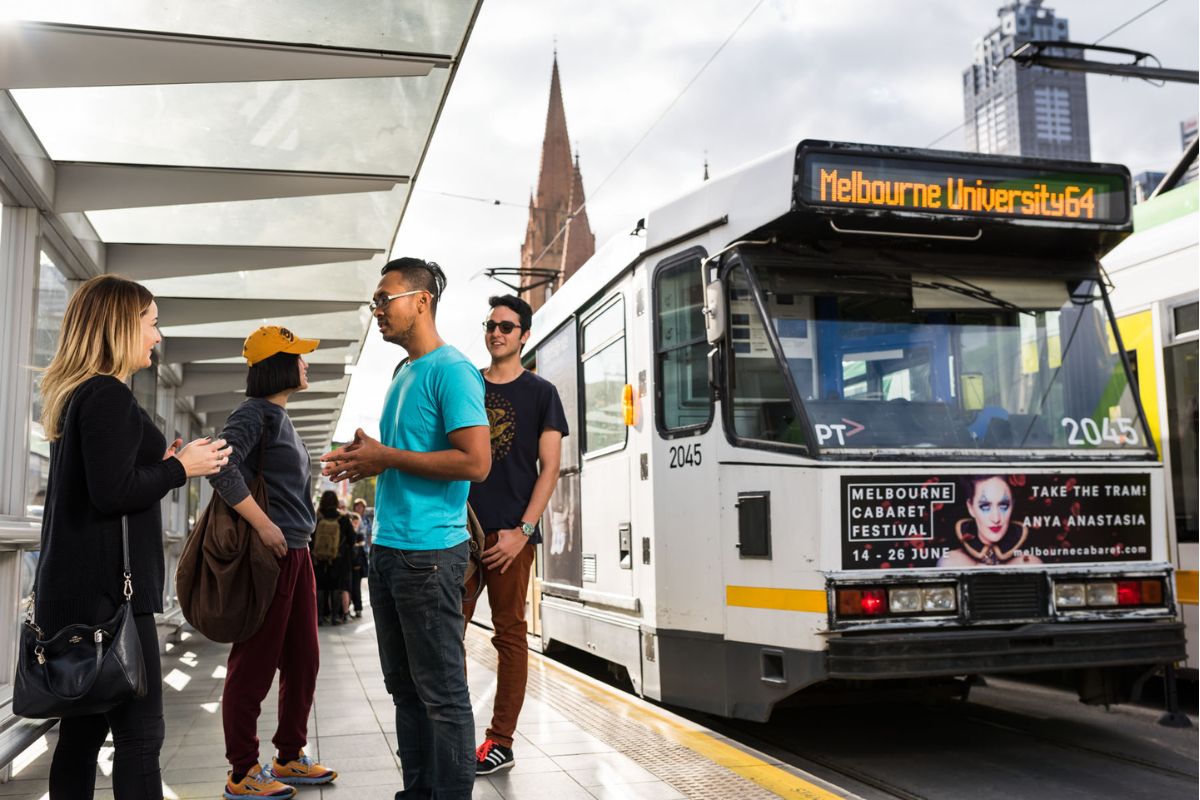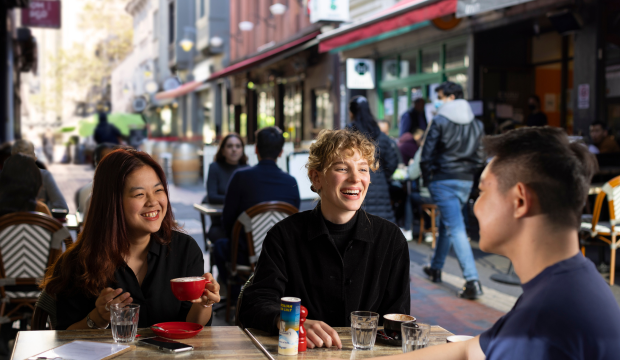View transcript
[Boppy music]
[Speaker: Pedro, International Student, scene is set inside a house]
Your first few weeks as an international student in a new city are so exciting, but incredibly important.
Let's go through some steps that you can take to help you settle in quickly.
That way, you're ready to enjoy all the life in Victoria has to offer!
[Scene switches to outside in front of a row of double story terrace houses on a tree lined street]
Firstly, it's time to move into a new home.
Depending on the type of accommodation you've chosen, there will be different preparations you need to make.
[Swoosh sound, scene moves to inside in front of a fireplace in a furnished room]
For example, if your accommodation is furnished, meaning it already has furniture - you can focus on stocking your kitchen and decorating.
[clicks fingers, furniture is removed from room]
If you're moving into a private rental that doesn't have any furniture, it's time to go shopping!
[Swoosh sound, scene moves to in front of a window close up, then laneways and shopping strips]
You won't have trouble finding stores selling homewares in your city.
Some secondhand stores, also known as “op shops”, also sell furniture and kitchenware at discounted prices.
You can also use social media and online marketplaces to find secondhand furniture and household items.
You’ll want to check if utilities are included, for example, electricity, internet and water.
[Scenes of Pedro walking in front of State Library of Victoria, busy city street corner and walking home through a treed laneway]
If they are not, you will need to arrange a provider.
Next, you’ll want to familiarise yourself with your new campus.
[Sunlit tall buildings, clouds in the sky]
Your education provider will hold an orientation week - sometimes called “O-Week” - for new students.
This will likely include campus tours, showing you where important services are, such as the library and security offices.
[Scenes around campus, Pedro checking phone from a high up building with views over the city]
If you already have your timetable, we recommend visiting your campus.
Visit the rooms and theatres where you will have workshops, tutorials and lectures.
It takes the pressure off trying to find them in the first week, especially if you're in a hurry between classes.
[Laneway scenes]
Finally, you’ll want to be up-to-date with everything happening at Study Melbourne, including all upcoming events and activities.
So, check out the website, sign up to the newsletter, and follow us on social media.
[Swoosh sound, laneway scenes, Hardware Lane signpost, looking up at heritage style building]
And, make sure to visit the Study Melbourne Hub in Melbourne’s city centre.
This space is dedicated to all international students in Victoria.
There is support, events, and a wonderful team full of advice to help you settle into life in Victoria.
We'll see you there soon!
[Smiles, Study Melbourne, Victoria Australia logo]
If you decided to rent a house or apartment by yourself or with friends, here is a checklist to help you to settle in and turn your new house into a home.
1. Review the Ingoing condition report
When you move into your private rental, the real estate agent or property manager will likely provide you with an ingoing condition report.
An ingoing condition report is a document intended to reflect the state of the property at the date you move in. It's your responsibility to check that what is on the report is correct and to update it where necessary before signing it and returning it to the agent by the due date.
When you move out, your agent will complete another condition report. If the property has been damaged, things are missing or the place is unclean, your agent may be able to claim the costs of this against your bond. You can learn more about paying bonds on our Your rights when renting page.
It’s crucial to carefully check both the incoming and outgoing inspection reports to make sure you aren’t charged for damages you didn’t cause.
2. Choose an energy supplier
One of the first things on your moving house checklist for Victoria should be choosing a provider for your electricity and gas.
There are many retailers offering energy services. Each supplier will offer different prices, accounts and billing options, so explore them to find the one that's right for you. You can learn more about getting connected via the Australian Energy Regulator.
3. Connect electricity
Depending on the terms of your lease, you may need to connect your electricity, which is also known as ‘power’.
It's a good idea to do this before you move in so you can ensure you’ll have energy from day one. There are various electricity retailers that can connect your power, including AGL, Click Energy and Origin. Do your research, compare the available plans and choose the one that’s right for you.
4. Connect gas
Some homes in Victoria use natural gas in addition to electricity.
Before you choose an electricity supplier, check to see if your home requires a gas connection as well. Some retailers can connect both and may even offer incentives or discounts. This also means you'll only have to set up and manage one account.
Changing your supplier
If you want to change providers, you'll need to check a few things first.
- Will switching save you money on your bills?
- What kinds of discounts and benefits does each company offer?
- How easy is it to manage your account?
- Will your current retailer penalise you for moving? For example, if you've signed up with your provider for a fixed term, you may have to pay an exit fee.
5. Set up your account
To connect your home's electricity or gas, you’ll have to set up an account with your chosen energy company.
Before signing up, ask your supplier what details you'll need to provide to open your account.
You'll probably be required to show a form of identification and provide some personal information, like your address, phone number, email and your bank details for payment.
6. Furnish your home
In most cases, privately rented homes in Victoria will come unfurnished.
Buying second-hand goods is an affordable way to furnish your home. Charity shops, otherwise known as opportunity or op shops, can be a great place to find quality used furniture and appliances. Salvos, Vinnies and Savers are some popular op shops with locations across Victoria.
You can also buy second-hand items online through platforms like Facebook Marketplace or Gumtree. Remember to exercise caution when purchasing goods from strangers. Don’t send a seller any money until you’ve inspected the item in person and, for your comfort and security, aim to meet in public, well-lit places when picking up products.
It's important to take care when buying second-hand electronics and appliances. In Victoria, used electrical items must be clearly labelled to say whether they have been safety tested. Electricians are qualified to check used electrical items and may charge a fee to do so.
7. Renting appliances
If you're only staying for a short while, it might be cheaper and more convenient to rent your furnishings.
Rental companies offer a wide range of furniture and appliances to lease, including fridges, desks, sofas, beds and televisions.
8. Connect an internet service
Another essential item on your moving house checklist is ensuring your home is connected to the internet.
There are several providers so do some research and find a plan that suits you.
Some areas of Victoria are covered by the National Broadband Network (NBN). Residents of these areas can purchase NBN internet plans, while those outside of these areas require a different type of connection, like ADSL2.
You can check your address on the NBN website to see if you're eligible or get in touch with your chosen supplier to discuss your options.
9. Purchase insurance
You may want to consider purchasing contents insurance, also known as renters' insurance. This is a type of coverage that protects your belongings from theft and damage like fire or flood.
Insurance is a great idea, particularly if you have expensive items that would be difficult to replace, such as electronics or sentimental jewellery.
You can discover more information on renting, bond and your tenancy rights on the Tenants Victoria website. If you require more guidance or help navigating issues with your rent, you can get free legal advice facilitated by the staff at the Study Melbourne Hub .
Page last updated:




